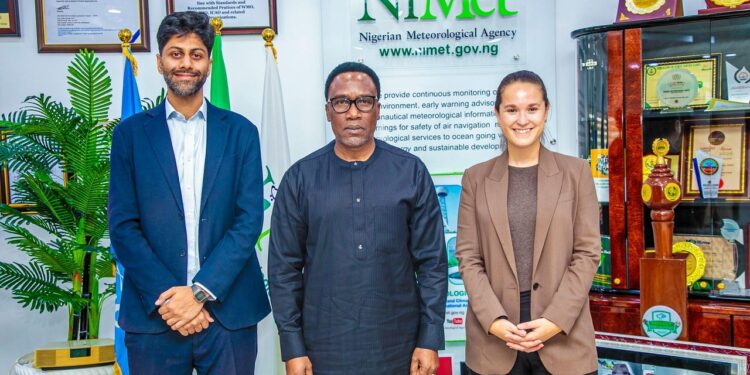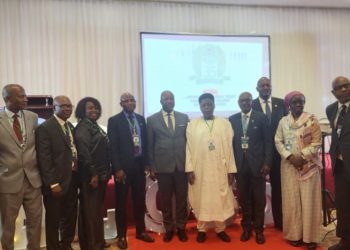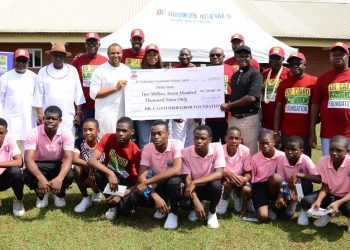By Nkechi Eze
The Nigerian Meteorological Agency (NiMet) has reaffirmed its commitment to harnessing artificial intelligence (AI)-powered weather forecasting systems to improve the accuracy, accessibility, and impact of weather and climate information for farmers across the country. This commitment was reiterated by the Director General and Chief Executive Officer of NiMet, Professor Charles Anosike, during a courtesy visit by the Agricultural Innovation Mechanism for Scale (AIM for Scale) team to NiMet headquarters in Abuja.
The AIM for Scale delegation, led by its Director, Imara Salas, and Scientific Director, Mohammad Farrae, visited the agency to explore potential avenues for collaboration aimed at strengthening climate-smart agricultural practices and boosting farmers’ resilience to weather variability.
AIM for Scale is a global consortium of partners committed to promoting agricultural innovation by scaling up weather services for farmers. Its key goals include co-developing strategies to expand weather service delivery, mobilising investment for innovative agricultural solutions, and integrating advanced technologies to support data-driven decision-making among smallholder farmers.
The consortium brings together an impressive array of global organisations, including the Bill & Melinda Gates Foundation, the United Arab Emirates (UAE), Asian Development Bank (ADB), Inter-American Development Bank, World Bank, U.S. Agency for International Development (USAID), NASA, Massachusetts Institute of Technology (MIT), Community Jameel, Mohamed bin Zayed University of Artificial Intelligence (MBZUAI), University of Chicago’s Human-Centered Weather Forecasts and AI for Climate (AICE) initiatives, World Meteorological Organization (WMO), and the United Nations Systematic Observations Financing Facility (SOFF).
Speaking during the meeting, Imara Salas expressed appreciation for the warm reception by the NiMet DG and described Nigeria’s inclusion in the first African pilot project as a significant step toward transforming weather-based agricultural practices. She explained that AIM for Scale’s vertical fund-style approach mobilises resources to deliver cost-effective and scalable AI innovations to millions of farmers globally. “Our goal is to create tailored innovation packages that help scale up solutions through partnerships with key institutions like NiMet,” she stated.
In his remarks, Professor Anosike thanked the AIM for Scale team for their visit and commended the inclusion of Nigeria in the consortium’s African pilot project. He noted that NiMet’s invitation to the just-concluded AI Weather Training in Abu Dhabi underscored global confidence in the agency’s technical capacity and commitment to advancing modern meteorological solutions.
Professor Anosike highlighted that NiMet’s vision aligns perfectly with AIM for Scale’s mission, stressing that accurate, timely, and localised weather forecasts are critical to agricultural productivity and food security. “As farmers increasingly rely on real-time weather data for planting, harvesting, and risk management, our goal is to ensure that such information is precise, timely, and accessible. AI-powered weather systems are key to achieving this,” he said.
The NiMet boss explained that the integration of artificial intelligence into forecasting processes enhances predictive accuracy, speeds up information delivery, and provides tailored advisories to specific user groups, especially smallholder farmers. “By embracing AI-driven innovations and strategic partnerships, we are redefining how weather information is produced and disseminated. This will improve farmers’ planning, reduce risks, and boost productivity nationwide,” he added.
Professor Anosike also identified key challenges facing meteorological operations in Nigeria, including the limited spread of in-situ weather stations and the urgent need to expand radar coverage across the country. He assured that the agency is already working on upgrading its infrastructure and expanding its observational network to close these gaps.
Following their meeting, the DG led the AIM for Scale delegation on a tour of NiMet’s central weather forecasting facility, showcasing the agency’s capabilities in data collection, analysis, and dissemination. The visit provided the AIM for Scale team with deeper insight into the operational framework that supports NiMet’s nationwide weather services.
Both parties agreed to develop and sign a Memorandum of Understanding (MoU) that will formalise their collaboration in joint research, capacity building, and technology deployment. The proposed MoU is expected to ensure the operational sustainability of AI-driven weather forecasting in Nigeria, positioning the country as a leader in climate-smart agriculture in Africa.
Professor Anosike reaffirmed NiMet’s readiness to leverage technology, innovation, and global partnerships to strengthen agricultural resilience and support the nation’s food security agenda. “With AI-powered forecasting, we are entering a new era of precision weather services that will transform farming outcomes and enhance livelihoods across Nigeria,” he concluded.

















